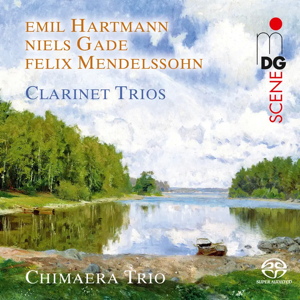
Emil Hartmann (1836-1898)
Sérénade in A major, op. 24
Niels Gade (1817-1890)
Novelletten in A minor, op. 29 (arr. piano, clarinet and cello)
Felix Mendelssohn (1809-1847)
Piano Trio in D minor, op. 49 (arr. piano, clarinet and cello)
Chimaera Trio
rec. 2023, Konzerthaus Abtei, Marienmünster, Germany
Reviewed as lossless WAV download
MDG 90323316 SACD [69]
Somehow when I decided to review this recording based on the publicity email, I managed to overlook the word “Clarinet” in large letters on the album cover, focussing instead on the mention of the op. 49 Mendelssohn trio. One of the downsides of downloads I guess; you don’t necessarily look at the cover image because you aren’t physically opening the CD case. So when I started to play it, I was expecting the conventional piano/violin/cello configuration and got a surprise. Only then did I look at the pdf booklet and see what I had really downloaded for review. A few years ago, I would have seen this as quite a disappointment, but I have recently heard a number of wind and string chamber music recordings, and enjoyed quite a few of them greatly.
The swap of instruments brings with it a very different soundworld, and this is demonstrated ably by the Mendelssohn, a work I know very well (and love). In this recording at times it sounds like a different piece of music. However, that may be in large part because the Chimaera Trio takes a very leisurely approach, almost five minutes slower than the Florestan Trio, a group not known for excessively fast tempos. The opening Molto allegro agitato is not so much agitated as slightly unsettled, the Scherzo certainly light (as per the leggeiro marking), but not quite as vivacious as the various violin versions I have heard. The Chimaera’s approach does suit the slow movement, which is languorous, a hot summer afternoon. Overall, the mellowness of the clarinet and the slow tempos make for a much gentler, but less satisfying experience.
In my piano trios survey, I wrote that the Gade Novelletten was pleasant but no more than that. In this clarinet guise, that opinion is reinforced; what edge the violin might have imparted, especially in the more forceful sections, is smoothed out by the clarinet. Again the Chimaera Trio adopts slow tempos, taking over nineteen minutes compared to under seventeen for the violin version I have. The approach is once more better suited to the slower movements, the outer Allegros robbed of what drive they do have.
The Hartmann Sérénade is the only work of the three to have been written for this combination, and I don’t think it is a coincidence that it is the best on the album. It is the second serenade of his that I have reviewed in the last year, the other (op. 43) being for a wind ensemble on Farao Classics (review). I enjoyed it as well, and my comments there apply equally well here: “influenced by Mendelssohn” and “full of joyful moments”. He well and truly outshines his brother-in-law (Gade) here.
This is the second release on MDG by the Netherlands Chimaera Trio, the first centred on Zemlinsky’s Trio with smaller works by Mahler, Berg and Webern. While it wasn’t reviewed on MWI, I can see one review that praises the playing. There is no doubt that the Hartmann demonstrates the group’s abilities, and even if I beg to differ with their choice of tempos for Mendelssohn and Gade, the actual playing of the instruments is excellent. Given that the Gade and Mendelssohn are both arrangements, it is a little disappointing that the booklet notes skim over this, only mentioning that Mendelssohn himself provided a version for flute instead of violin, but no indication at all of where these clarinet versions came from. The sound quality is excellent, and I have to praise the engineers for capturing the instruments so well without getting extraneous noises.
The Gade simply isn’t memorable music, and the Mendelssohn is robbed of some of its magic, mostly by the tempos, but also by the combination of instruments. However, the Hartmann is very enjoyable, and definitely worth the occasional play.
David Barker
Buying this recording via a link below generates revenue for MWI, which helps the site remain free.



















